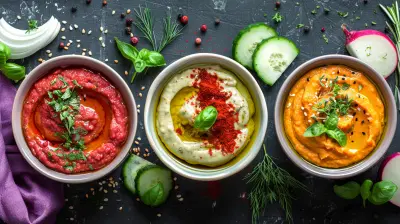Mindful Eating: How Awareness Can Improve Your Nutrition
26 May 2025
Have you ever found yourself devouring a bag of chips while binge-watching your favorite Netflix series, only to realize that the bag is empty before you even tasted the first bite? You're not alone. In today’s fast-paced world, we often eat on autopilot, disconnected from our food and bodies. But what if I told you there’s a way to change that?
Welcome to mindful eating—a simple yet powerful practice that can transform your relationship with food. It’s not another diet trend or a restrictive eating plan. Instead, it’s about being fully present while you eat, listening to your body, and enjoying every bite with intention.
In this article, we’ll dive deep into mindful eating, uncovering its benefits, how it works, and practical strategies to incorporate it into your daily life. 
What Is Mindful Eating?
Mindful eating is the practice of being fully aware of what, how, and why you're eating. It draws inspiration from mindfulness—a form of meditation that encourages living in the present moment without judgment.Unlike dieting, which focuses on restrictions, mindful eating prioritizes awareness and intuition. It helps you recognize hunger and fullness cues, appreciate the flavors in your food, and develop a healthier relationship with eating.
Think about it: when was the last time you truly tasted your food? Felt the texture, noticed the aroma, or savored the flavors? Most of us rush through meals without a second thought. Mindful eating brings back that lost connection. 
The Science Behind Mindful Eating
Mindful eating isn't just a feel-good concept—it’s backed by science. Studies have shown that practicing mindfulness while eating can:✅ Reduce binge eating – A study published in Obesity Reviews found that mindful eating significantly helps people reduce emotional and binge eating.
✅ Aid in weight management – Research suggests that mindful eaters are less likely to overeat, leading to healthier weight regulation without restrictive dieting.
✅ Improve digestion – Eating slowly and chewing thoroughly enhances digestion and nutrient absorption.
✅ Lower stress levels – Stress eating is real! Mindfulness reduces stress responses, preventing emotional eating triggers.
✅ Promote better food choices – When you eat mindfully, you tend to choose healthier foods, appreciating their taste and nutritional benefits.
These benefits make mindful eating a sustainable and effective approach to nutrition—no calorie counting required! 
Why We Eat Mindlessly
Before diving into mindful eating techniques, let’s address the elephant in the room—why do we eat mindlessly in the first place?1. Distractions Are Everywhere
From scrolling through social media to watching TV during meals, our focus is rarely on the food in front of us. These distractions lead to overeating since we don’t register how much we’ve consumed.2. Emotional Eating
We often turn to food when we’re stressed, anxious, or even bored. Instead of eating to nourish our bodies, we eat to fill an emotional void.3. Super-Sized Portions
Restaurants and fast-food chains serve oversized portions, making it easy to eat more than what our bodies actually need.4. Eating Too Fast
In our rush to get through meals, we eat too quickly, giving our bodies no time to signal fullness. The result? Overeating and bloating.Recognizing these triggers is the first step toward developing a mindful eating habit. 
How to Practice Mindful Eating
Now that we know why mindful eating is important, let’s talk about how to do it.1. Eat Without Distractions
Turn off the TV, put your phone away, and sit at the table. Focus entirely on your food and the act of eating.2. Engage Your Senses
Before taking a bite, notice the colors, textures, and aromas of your food. When you chew, pay attention to the flavors and how they change with each bite.3. Chew Slowly and Thoroughly
Instead of rushing, slow down. Chew each bite at least 20–30 times before swallowing. This not only aids digestion but also allows you to fully enjoy your meal.4. Listen to Your Body’s Hunger Cues
Ask yourself: Am I really hungry, or am I eating out of habit? Rate your hunger on a scale of 1 to 10 before eating. Stop when you’re comfortably full, not stuffed.5. Appreciate Your Food
Take a moment to express gratitude for your meal. Whether you cooked it or ordered it, acknowledge the effort that went into preparing it.6. Identify Emotional Triggers
Next time you crave junk food, pause and ask, “Am I feeling stressed, sad, or bored?” If food is your emotional escape, try alternative coping mechanisms like journaling, walking, or deep breathing.7. Portion Control Without Deprivation
Instead of piling food onto your plate, serve yourself a moderate portion. You can always go for seconds if you're still hungry.8. Savor Every Bite
Imagine you're a food critic at a five-star restaurant. How would you describe the dish? This mindset shift helps you eat with greater awareness and appreciation.9. Practice the "Half-Plate Rule"
Before finishing your meal, pause when you’re halfway through. Ask yourself if you’re still hungry. If the answer is no, stop eating.10. Be Kind to Yourself
Mindful eating isn’t about perfection. If you slip into mindless eating, don’t beat yourself up—just refocus on your next meal.Mindful Eating vs. Dieting
Mindful Eating:
✔ Focuses on awareness and enjoyment✔ Encourages listening to your body
✔ No food restrictions
✔ Sustainable and long-term
Dieting:
❌ Focuses on rules and restrictions❌ Often ignores hunger and fullness cues
❌ Encourages guilt around food
❌ Typically short-lived
Mindful eating isn’t about losing weight—it’s about reconnecting with food. Weight loss can be a side effect, but the real reward is developing a healthy and guilt-free relationship with eating.
Final Thoughts
Mindful eating is a simple yet life-changing approach that helps you enjoy food in a more meaningful way. By slowing down, tuning into your body's hunger signals, and appreciating every bite, you can build a healthier relationship with food—one that’s free from guilt, stress, or restriction.So, the next time you eat, pause, breathe, and savor the moment. Your body and mind will thank you for it.
all images in this post were generated using AI tools
Category:
NutritionAuthor:

Eileen Wood
Discussion
rate this article
3 comments
Maren Griffin
Great insights on mindful eating! It’s essential to cultivate awareness in our eating habits for improved nutrition and overall well-being.
June 18, 2025 at 4:53 AM

Eileen Wood
Thank you! I'm glad you found the insights valuable. Mindful eating truly can transform our relationship with food and enhance well-being.
Clover Montgomery
Unlock hidden cravings: Is awareness the key to your nutritional transformation?
May 29, 2025 at 5:02 AM

Eileen Wood
Absolutely! Awareness is the first step to recognizing and addressing hidden cravings, leading to healthier nutrition choices.
Corin McGrath
Awareness transforms habits into health.
May 28, 2025 at 2:40 AM

Eileen Wood
Absolutely! Awareness is the first step to mindful eating, leading to healthier choices and sustainable habits.



